Our Core i3 N3050 vs Core i3 1215U comparison tests both CPUs in different productivity software to see which one is worth the price. We will also discuss the architectural differences along with the specs of these two CPUs.
Key Takeaways
- To begin with, the Core i3 1215U showcases an impressive 31.3% lead in single-core benchmarks, affirming its prowess in swiftly handling individual tasks and applications with remarkable efficiency.
- Boasting a substantial 35.8% advantage in multi-core benchmarks, the Core i3 1215U shines as the go-to choice for managing demanding workloads and multitasking scenarios.
- With support for memory configurations of up to 64GB, the Core i3 1215U takes the lead in memory capacity, providing ample space for memory-hungry applications and amplifying its adaptability.
- Differentiating itself, the Core i3 1215U offers PCIe Gen 4.0 support, a forward-looking feature that positions it ahead for compatibility with cutting-edge technologies, setting it apart from the Core i3 N305.
Comparison Table
| Key Specifications | Core i3 N305 | Core i3 1215U |
|---|---|---|
| Vendor | Intel | Intel |
| Release Date | January 3, 2023 | February 23, 2022 |
| Device Type | Laptop | Laptop |
| Instruction Set | x86-64 | x86-64 |
| Integrated GPU | UHD Graphics (32EU) | UHD Graphics (64EU) |
| Efficient Cores | 8 | 4 |
| Efficient Threads | 8 | 4 |
| Base Clock (E) | 1.8 GHz | 0.9 GHz |
| Boost Clock (E) | 3.9 GHz | 3.3 GHz |
| Total Cores | 8 | 6 |
| Total Threads | 8 | 8 |
| L1 Cache | 96K (per core) | 80K (per core) |
| L2 Cache | 2MB (shared) | 1280K (per core) |
| L3 Cache | 6MB (shared) | 10MB (shared) |
| Fabrication Process | 10nm | 10nm |
| TDP (PL1) | 9-15W (configurable) | 12-15W (configurable) |
| Socket | BGA-1744 | BGA-1744 |
| GPU Base Clock | 300 MHz | 300 MHz |
| GPU Boost Clock | 1250 MHz | 1100 MHz |
| Cuda Cores | 256 | 512 |
| Execution Units | 32 | 64 |
| Memory Support | 16GB | 64GB |
| ECC Support | No | No |
| PCI Express Version | 9 x 3.0 | 20 x 4.0 |
Architectural Differences
As we venture into the realm of architectural differences, we’ll unveil the unique blueprints that shape the Core i3 N3050 and Core i3 1215U processors. These architectural variances lay the foundation for the divergent capabilities and performance aspects we’re about to explore further.
- Process Node: Starting off, the Core i3 N305’s advanced 10nm process node, in sync with the Core i3 1215U, reflects cutting-edge fabrication technology, shaping their performance capabilities for modern computing demands.
- Clock Speed: While the Core i3 N305 clocks in with a spirited Base Clock of 1.8 GHz and a Boost Clock of 3.9 GHz, the Core i3 1215U shows a difference, featuring a Base Clock of 0.9 GHz and a Boost Clock of 3.3 GHz, creating distinct pulsations of power.
- Memory Support Variation: Delving into memory capacity, the Core i3 N305 supports up to 16GB, catering to efficient multitasking, while the Core i3 1215U stretches its limits with up to 64GB, beckoning users with extensive memory needs.
- TDP: Moreover, with energy efficiency in the spotlight, the Core i3 N305 boasts an adaptable TDP range of 9-15W, engaging in power optimization. Meanwhile, the Core i3 1215U showcases a similar TDP range of 12-15W, maintaining an equilibrium between performance and energy conservation.
- Supported Technologies: As the digital landscape evolves, the Core i3 N305 extends support for PCIe Gen 3.0, fostering data flow, while the Core i3 1215U steps up the game with compatibility for PCIe Gen 4.0, inviting future-ready technology integration.
Core i3 N305 Vs Core i3 1215U: Performance Benchmarks
Now, it’s time to put these processors to the test through a series of comprehensive benchmark software. By analyzing their real-world performance metrics, we aim to provide you with valuable insights into how these CPUs fare in various computational scenarios.
Cinebench R23 (Single-Core)
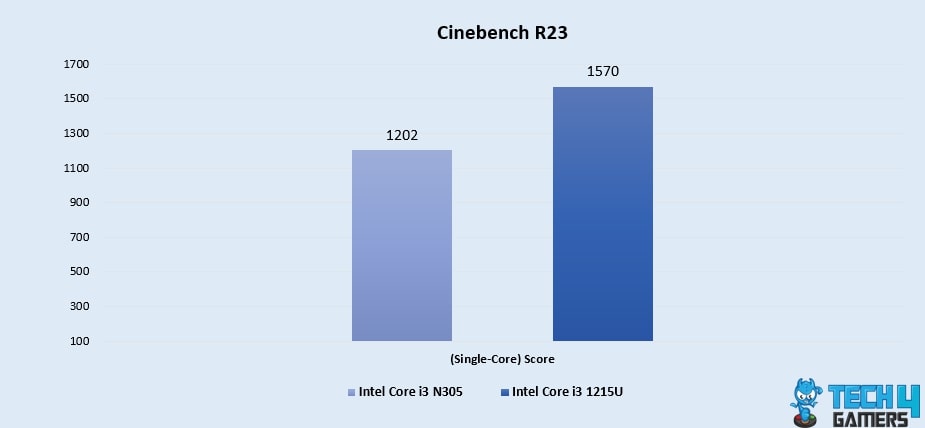
- Witnessing a steady performance, the Core i3 N305 scores 1202, while the Core i3 1215U takes a confident stride with a 26.5% lead, reaching a score of 1570, offering enhanced single-core responsiveness.
Cinebench R23 (Multi-Core)
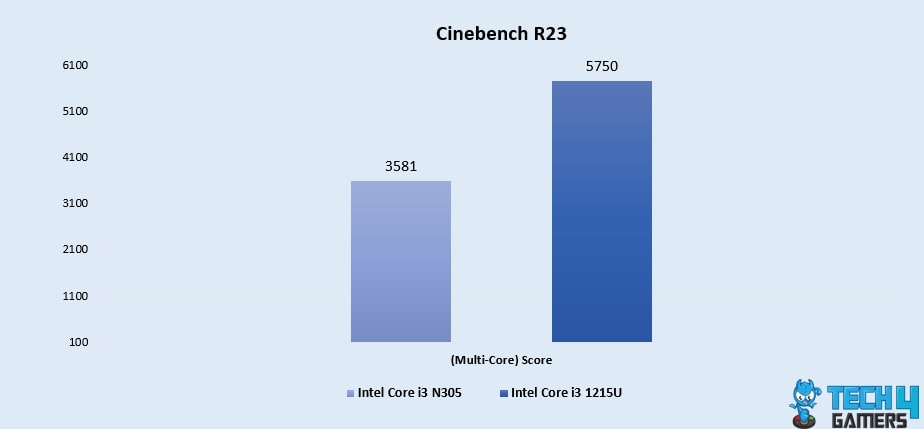
- Engaging in multi-core tasks, the Core i3 N305 garners a score of 3581, and yet, the Core i3 1215U takes a leap with an impressive 46.4% surge, amassing a score of 5750, showcasing superior multi-core prowess.
Geekbench 5 (Single-Core)
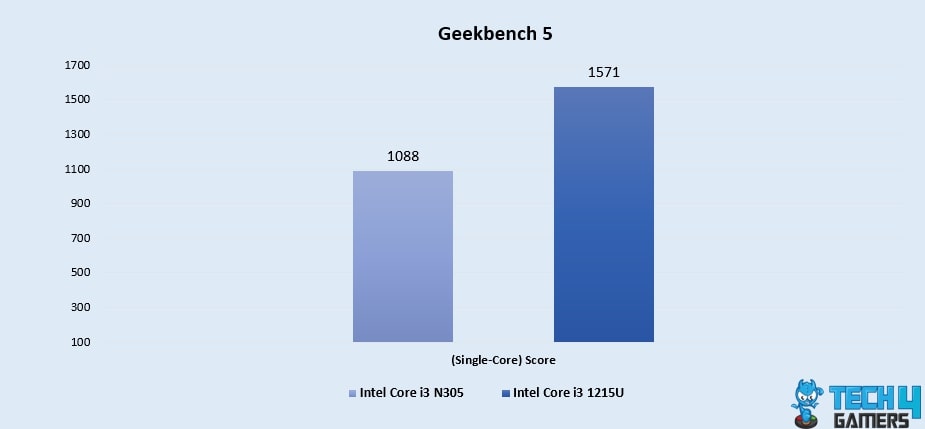
- In the realm of single-core Geekbench 5 performance, the Core i3 N305 charts a course with a score of 1088, while the Core i3 1215U claims a 36.3% ascent, landing at a score of 1571, epitomizing boosted single-core capabilities.
Geekbench 5 (Multi-Core)
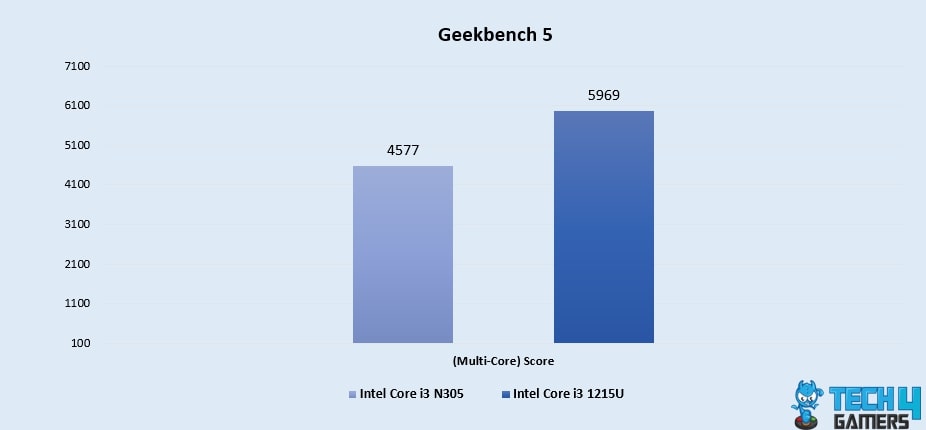
- Navigating through the multi-core territory, the Core i3 N305 maintains momentum with a score of 4577, and yet, the Core i3 1215U marches forward with a solid 26.3% growth, tallying up a score of 5969, exemplifying an elevated multi-core proficiency.
Core i3 1215U Vs Core i3 N305: Which One Is Right For You?
- Firstly, the Core i3 1215U showcases a remarkable 31.3% advantage in single-core benchmarks, rendering it a favorable choice for users who value quick and efficient execution of individual tasks and applications.
- With an impressive 35.8% lead in multi-core benchmarks, the Core i3 1215U emerges as the preferred option for handling resource-intensive workloads and multitasking scenarios, ensuring smoother performance in demanding computing tasks.
- While both chips offer configurable TDPs, the Core i3 1215U supports memory configurations of up to 64GB, offering ample capacity for memory-intensive applications and enhancing its versatility.
- Finally, the Core i3 1215U supports PCIe Gen 4.0, providing a forward-looking advantage for users seeking compatibility with the latest and future technologies, setting it apart from the Core i3 N305.
Thank you! Please share your positive feedback. 🔋
How could we improve this post? Please Help us. 😔
[Comparisons Expert]
Shehryar Khan, a seasoned PC hardware expert, brings over three years of extensive experience and a deep passion for the world of technology. With a love for building PCs and a genuine enthusiasm for exploring the latest advancements in components, his expertise shines through his work and dedication towards this field. Currently, Shehryar is rocking a custom loop setup for his built.
Get In Touch: shehryar@tech4gamers.com


 Threads
Threads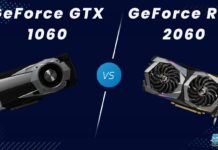
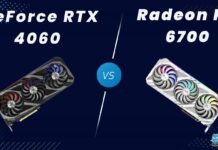
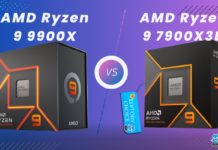
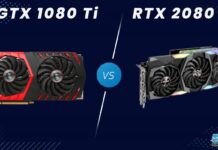
![GTX 1660 Ti Vs RTX 3050 [We Tested Both]](https://tech4gamers.com/wp-content/uploads/2023/06/GPU-Comparison-Template-NEW-1-1-218x150.jpg)